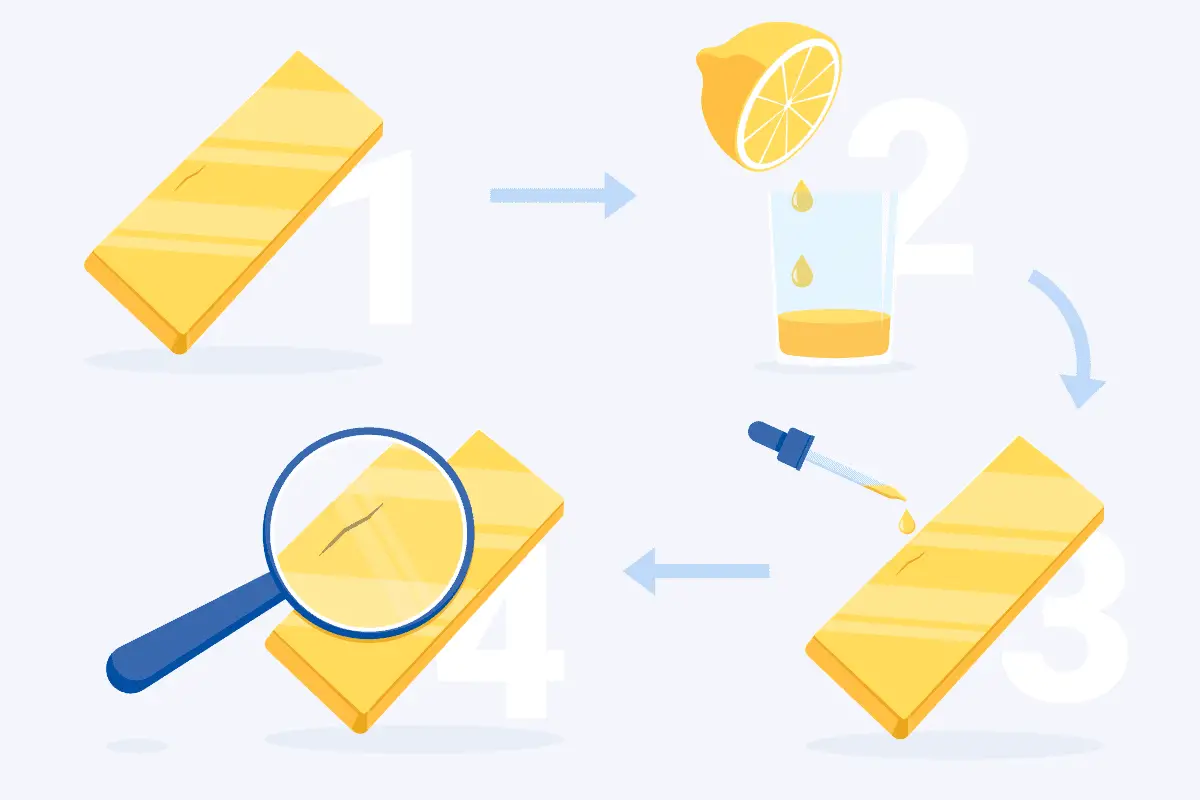How to Test Gold at Home with a Lemon: Easy DIY Method
Find out how to test your gold at home with a lemon and everything you should know about this easy DIY method.
By Jane Pardo | Updated January 4, 2024
Lemon juice is very acidic, making it a possible testing technique to verify gold authenticity. Using this common household item to tell if your gold is real involves a simple scratching method.
Table of Contents
Spot fake gold with the lemon method
Prepare a fresh lemon, a liquid dropper, and a needle. Make a tiny scratch on your gold piece, like the back or bottom. Slice the lemon and squeeze it onto a glass. Put a small drop of lemon juice onto the scratch using the liquid dropper. Observe any color changes in your gold. Real gold will retain its lustrous sheen and stunning yellow color.
Fake or impure gold will likely darken or show discoloration. It’s a good idea to repeat the process on several spots so that you can evaluate the results better.
A ripe lemon is ideal for this testing method. Lemons become more acidic as they ripen because they accumulate higher amounts of citric acid.
If you don’t have a liquid dropper, you can directly squeeze a small amount of lemon onto the tiny scratch on your gold. Thoroughly rinse your gold item after testing it with lemon, and wipe it with a soft, clean cloth.
Why the lemon method could work
Real gold is highly durable and resistant to corrosion and tarnishing even when exposed to most acidic substances, including lemon juice.
On the other hand, impure gold, particularly those with low-quality metals, may react to the high acidity in lemon juice. There may be a noticeable color change if the gold is impure.
The lemon method can reveal gold plating
If you’re having doubts about your solid gold jewelry or bullion, the lemon application can help confirm whether it’s gold-plated.
Gold-plated items and counterfeit gold typically have a thin overlay with a base metal underneath that may react to the acidity in lemon juice. Creating a scratch on the upper layer allows the lemon juice to reach the base metal and cause discoloration.
However, this method is not ideal if you want to keep your gold flawless and scratch-free. Learn our top gold testing methods. You can also purchase this gold testing kit online.
FAQs about testing gold with a lemon
Can I test gold by soaking it in lemon juice without scratching?
Soaking gold in lemon juice is not suitable for determining its authenticity. The acidity in lemon is not strong enough to make a visible difference after a soak. Applying a drop of lemon juice directly on a small scratch on gold may bring better results.
Can lemon juice damage gold?
Lemon juice has no effect on solid gold. However, it is too abrasive for gold-plated jewelry. It may also damage lower gold karats, which contain significant amounts of metals for durability. Prolonged exposure can cause discoloration or severe damage.
Is the lemon method dependable?
While lemon is very acidic, the lemon method is not an accurate way to verify if gold is real. Various factors can lead to false results, particularly the acidity level of the lemon juice and the type of metal alloy. Consult a qualified appraiser to have your gold examined using proven methods. You can also purchase a u003ca href=u0022https://www.amazon.com/Silver-Jewelry-Tester-Appraisal-Precious/dp/B09D6HR4XR?crid=MXFK5ZJC1YOUu0026amp;keywords=gold+testing+kitu0026amp;qid=1676052482u0026amp;sprefix=gold+test%2Caps%2C145u0026amp;sr=8-5u0026amp;linkCode=ll1u0026amp;tag=goldfunctioncom-20u0026amp;linkId=1bdfa8b67c1245cfe7364c5186ea8ea6u0026amp;language=en_USu0026amp;ref_=as_li_ss_tlu0022 target=u0022_blanku0022 rel=u0022noreferrer noopeneru0022u003egold testing kitu003c/au003e online.
Written by Jane Pardo

Jane Pardo is our senior gold & silver expert. Jane lends insight into precious metals investing, collecting, testing, and maintenance.
Trending posts under
As participant in an affiliate advertising program, we earn from qualifying purchases.